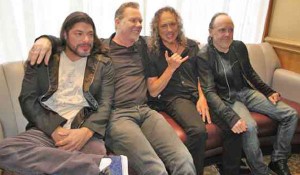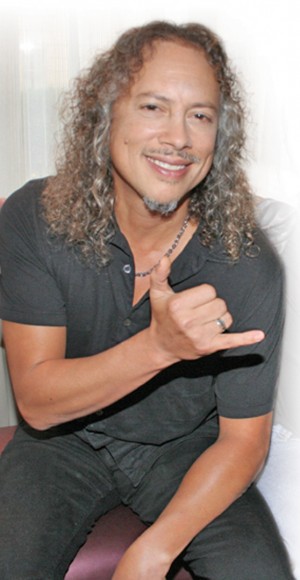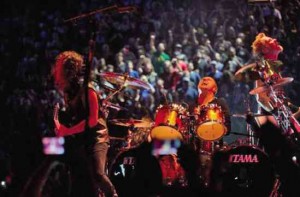Metallica in a 50s club: Who would have thought?
LOS ANGELES–“Pinoy Power!” Kirk Hammett, Metallica’s part-Filipino lead guitarist and songwriter, exclaimed when we met the band recently at the The Fairmont Hotel in San Francisco. Kirk’s mom, Teofila Oyao, is from Cebu (dad is of Irish heritage).
The curly-haired musician, ranked by Rolling Stone as one of the greatest guitarists of all time, said his family searched for relatives in Cebu and found they were “either in the military or in prison.” I couldn’t tell if he was joking about the prison part. He also said he loved Filipino food.
Kirk, James Hetfield (vocals, guitar), Lars Ulrich (drums) and Robert Trujillo (bass, backup vocals) had premiered their 3D feature film, “Metallica Through the Never,” the night before at San Francisco’s AMC Metreon. Combining spectacular live-performance footage staged exclusively for the film, with a narrative starring Dane DeHaan (we wrote earlier that he made his feature film debut in the Bohol-shot “Amigo” by John Sayles) as a young roadie named Trip, who will do anything to recover a mysterious bag, the film is, well, a trip.
It’s a wild, entertaining one directed by Nimrod Antal, whose credits include “Predators” and “Kontrol!” and it comes with a brutal masked horseman and urban riots, interspersed with the band singing many of its iconic songs before thousands of fans.
Robert, who turns 49 next month, and Lars, who notches 50 in December, jokingly hugged each other at one point in the interview and quipped that they were “the spring chicken club” while Kirk and James, both 50, belonged to “the old club.”
Article continues after this advertisementI asked about their weirdest experience on stage. Kirk replied, “We played in Castle Donington (Central England) in 1985. That’s when it was very trendy to relieve yourself into a bottle, close it and throw it up on stage (laughs). They don’t do that anymore but they did that a lot back in the 1980s at British festivals.
Article continues after this advertisementFlying bombs
“So when we walked out there, we were doing all we could to dodge these flying bombs. Then food started coming on stage, even a raw pig’s head. Why they were carrying a pig’s head to a concert was anyone’s guess.” Where was security? “This was the ’80s,” Kirk said. “It was relaxed back then.”
James continued the story: “[The pig’s head] was left over from the barbecue, I hope.” Kirk added, “Or maybe someone’s dressing room.”
Kirk explained what heavy metal represented: “I personally feel that heavy metal is the true world music. Everywhere we go, we find a large contingency of people who love heavy metal. When we were starting out in the ’80s, I thought heavy metal was just a part of Western Europe and America. But we started traveling to other places like South America and Asia, and I soon realized that heavy metal was everywhere.
“So I deduced that heavy metal was something that certain human beings could relate to easily, for different reasons. As Lars said, we are not here to tell you what something means to us, because it can mean a billion different things to a billion different people.”
Lars volunteered, “To me, heavy metal represents two elements that could be contradictory but when I was growing up, it gave me a sense of belonging. I was an only child; it made me feel part of something bigger than myself—almost like another family.”
Told that the director, Nimrod, said the same thing, Lars cracked, laughing, “Well, I am going to have a talk with him.” Then he added, “Today, Metallica to me represents creative, artistic freedom—we can do what we want.”
Living two lives
As for their life on the road now that they were family men, versus what it was like when they started, James remarked, “There are stereotypes that happened out there. When we were growing up, we wanted all of that; that was part of the dream, show up in a town…”
Lars: “Rape and pillage…”

METALLICA today (from left): Robert Trujillo, James Hetfield, Kirk Hammett, Lars Ulrich. photo by ruben nepales
James: “… destroy and leave. That mentality got us in a lot of trouble—
having to try things that we heard happened in the ’70s… destroying hotel rooms… Being a family man [now], I mean, it’s two lives that have to be congruent in some way: Living like a king on the road, being pampered, everything is done for you. Then I come home and my wife is saying, ‘Look at that pile of dishes.’ Like, ‘Yeah?’ It can be difficult if I don’t take care of the transitions. So I try not to be as pampered on the road.
“But family comes first. It is the most important thing in my life. So during summer, they get to come out on the road and experience the awesome world that we get to explore. When we are on the road during the school year, it’s a little more difficult. But we have schedules in place, where we are not gone more than two weeks at a time, so we get to go home. We are all fathers here. That’s our most important gig.”
Lars elaborated: “It’s very important to set boundaries. Like James was saying, we have a two-week rule and it gets us home to our kids. We do America in one-week increments—a week on, a week off. We do the rest of the world in two-week increments—two weeks on, two weeks off. It prevents us from falling off the deep end. There are not long-enough stretches for us to start losing it. We have a really good sense of balance with this stuff nowadays.
“We lived a lot of crazy things back in the ’80s. Fortunately, they never ended up sensationalized, which happened to a lot of our peers. We lived a lot of the same stuff that everybody else did; they all got written about. We were more under the radar.”
And this band that’s considered one of the most popular and influential rock bands in history is still very much around. “And we have big smiles on our faces. So it all worked out okay.”
On the four of them now 50 years old or nearing that milestone, Robert embraced Lars and exclaimed as he laughed, “We are 100 together! A 50s club, yeah!”
Robert said, “To me, Metallica represents positive energy. You see it on the faces of our fans of all ages around the world. We are pretty wild and crazy in terms of creativity. Taking on a film like ‘Through the Never’ was a real passionate journey for us. It wasn’t a smooth ride. There was a lot of creative headbutting but we are so proud of the film.
Grinning, Robert recalled, “My first gig with Metallica was at the San Quentin State Prison. I thought, ‘It’s going to be crazy working with these guys.’ But it keeps things interesting. We push ourselves creatively. We don’t get bored. It’s exciting.”
Kirk said, “Our music is very cathartic in [the sense] that if you had a bad day or have a bad life, you have that anger, resentment, aggression—you need to take it out in a safe way. That’s where we come in.
Back to the subject of age, Robert shared, “I took my kids to see Black Sabbath at the LA Sports Arena. My son is 9 and my daughter is 7. My son was so engaged. Music really speaks to every age. [Black Sabbath is] obviously older than us and they held it. It was really impressive.
Lars quipped with a chuckle, “The physicality of what we do is obviously the biggest matter at 50, 49.”
James to Lars: “Dude, you are going to get it, man, on your birthday.”
Lars conceded, “We are pushing it, obviously. If 30 years earlier, you said that we’d be rocking out at 50, nobody would have believed that. We appreciate the fact that there are so many people [around the world] who want this. So we have made it a conscious effort to look after ourselves, to be able to deliver. We have two people who travel with us everywhere whose job is to stretch, massage and stitch us back together. We eat, sleep, travel well. We take this seriously.
Playing better
“In one of our shows in Shanghai, I had an issue with my arm. For the last 30, 40 minutes of the show, I could barely move my arms and played mostly on the set with one arm. James has issues with his back, Kirk with his fingers, Rob with his knees (laughs).”
James teasingly hushed Lars, who carried on: “So we play each show with the understanding that there is always something that can go wrong. With much love and respect to The Rolling Stones, they are 70. I hope we can still be doing what we are doing when we are 70. I don’t know if we will still be standing up when we are 70.
“But maybe the bigger question is, if we can’t do this at 100 percent and can do it only at, say 50 or 30 percent, will the music suffer? To me, that’s the biggest question—whether at 65, it becomes more like a parody.
“So we play each show like it’s our last. Every time we get off stage, we have smiles on our faces. People comment that we are playing better than ever because we are looking after ourselves.”
(E-mail the columnist at [email protected]. Follow him at https://twitter.com/nepalesruben.)

